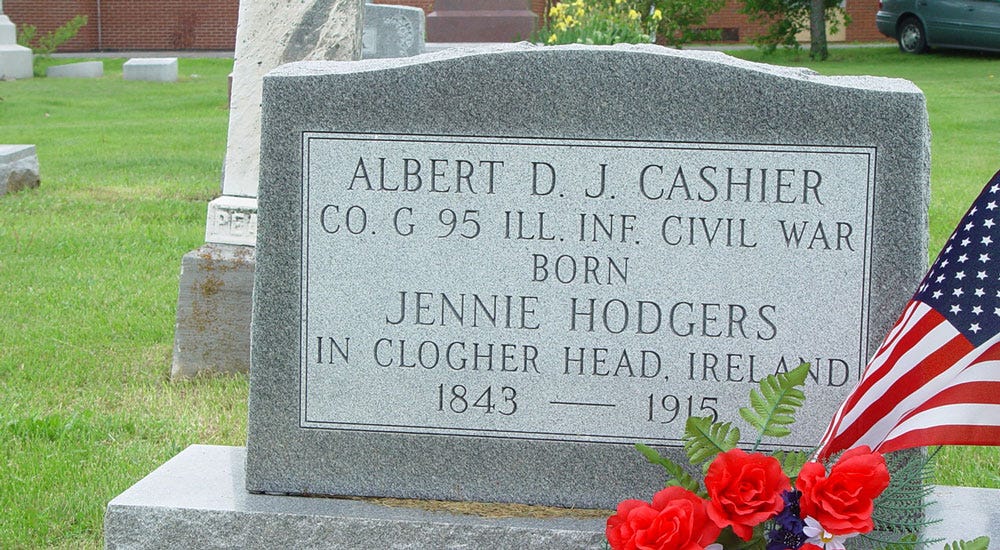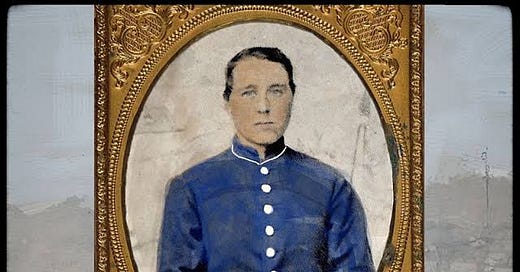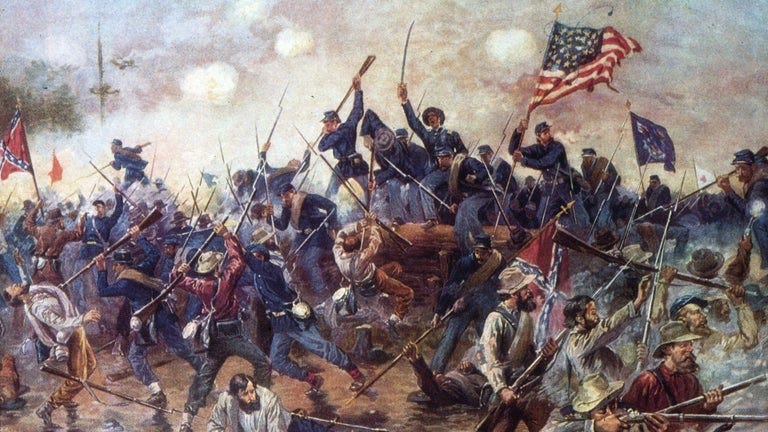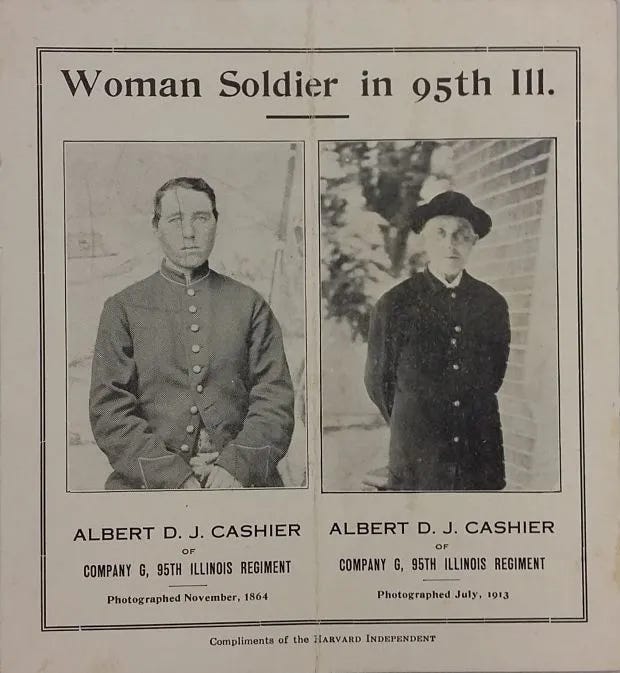the trans civil war soldier
albert cashier began identifying as a man to get jobs and never looked back
there are many records of women who disguised as men to fight in the civil war, approximately 400 on the union side and 250 on the confederate side. the war begin in april 1861 after tensions between the northern and southern states reached a breaking point and suddenly the need for soldiers was dire. medical screenings were routinely skipped over and pre-pubescent boys were enlisted to fight alongside adult men. as a result, many women fighters went undetected.
why did they do it? well it wasn’t a great time to be a woman in 1861. the victorian era had literally suffocating expectations of women - be submissive, wear restrictive clothing, and focus on your husband and family. they were raised to housewives and were often married off between ages 18-20, confined to domesticity for the rest of their lives. it was these expectations that drove many to the battlefield, eager to experience independence at whatever cost.

while many of those soldiers returned to life as women at the end of the war, there were some who didn’t. some kept their male identity to work jobs and support their family. but one soldier kept it for far longer - throughout the battlefield, throughout the post-war period, in sickness and in health. his name was albert cashier.
if you went back in time and told albert he was transgender, he wouldn’t know what you’re talking about. the term did not really exist, but albert’s commitment to his male identity and appearance have led historians to believe he was transgender.
***
albert cashier was born a girl in ireland, 1843. not much is confirmed about his childhood, but according to stories, albert came from a poor family. his grandfather used to dress him up as a boy to get a job. in the early 1860’s, a teenaged albert snuck onto a boat headed for the united states, somewhere on the east coast. albert continued dressing as a boy to get a job at an all-male shoe factory, the best paying job in town. eventually, albert took the money and headed west, settling in illinois.
the civil war began in 1861, and illinois began calling for soldiers to fight for the union. at this point, the scrappy albert was more than qualified for battle. at just 18 years old, albert had worked most of his life. from long hours at the shoe factory, to demanding work as a farmhand. he promptly enlists in the 95th Illinois Infantry, taking advantage of the army’s desperation and skipping over the medical screening. at 5 feet tall and 110 pounds, the ever-so-snatched albert definitely looked different from the rest of the soldiers. but at the time it was common for smooth-faced, teen boys to fight in the war. albert was accepted as “one of the boys” and no one suspected his biological sex.
the unit trained for two months before heading out for battle. albert was an excellent infantryman, consistently scoring in the top during exercises. he was well-liked by his peers, although some did find it odd that albert was strict about bathing privately. as talented as albert was, he might have been training so hard for another reason: wounded and diseased soldiers were taken to medic tents where people could find out his secret.
albert fought in over 40 battles, including the siege of vicksburg in 1863 and the battle of nashville in 1864 - both decisive union victories. he fought in battles that were confederate victories too. during one battle, albert was captured by confederate soldiers. he narrowly escaped death by wrestling a gun out of the soldier’s hand, shooting him and reaching the safety of union lines. however, the encounter did injure him pretty bad and albert was forced to go to a medic tent. it was then a nurse found out about his biological sex, but chose to not disclose it. it’s not known whether the nurse did that out of loyalty to albert, or to the union army, but this time, albert’s secret stayed with him.
the civil war ended in 1865 and albert returned home to illinois after being honorably discharged. he marched a total 10,000 miles in the war and lost about 289 fellow fighters to death and disease. but life had to go on. the united states was ravaged after the war and there was money to be made in its rebuilding. albert continued living as a man and working odd jobs for the decades to follow. he worked on a farm, as a church janitor, cemetery worker, and street lamplighter. albert also collected his military pension and voted in elections. remember at this time, women were not allowed to vote.
at one point, albert found a job as a driver for illinois state senator, ira lish. one day in 1910, as albert was inspecting his vehicle, ira lish climbed into the car to assist and accidentally ran over albert’s leg. albert never quite fully recovered from this accident and was sent to live in a illinois home for veterans. it was during a medical exam here that his biological sex was discovered by staff.
the medical staff went back and forth on whether to reveal this piece of information. but at this home, albert was wildly popular. several of his fellow comrades came to visit him, entertaining albert with stories and recalling their times in battle together. these stories and cheerful times uplifted the spirits of the other veterans in the home. seeing the overall positive effect albert had on his fellow men, the staff decided not to disclose it.
albert remained at this home until 1913 - at age 70 - when he developed dementia. he was then transferred to a mental hospital where, again, his biological identity was discovered. the staff at this hospital were less graceful and forced albert to wear women’s clothing. they also leaked this information to the press and albert became a media frenzy.
the press was astonished at this “woman pretending to be a man.” albert’s birth name, jennie, had been leaked and he was intentionally referred to as that. the government charged albert with defrauding the military, saying he only lied about his gender to get military pension. with his deteriorating health, this was a lot for albert to handle. not used to walking in woman’s clothing, albert tripped on his dress and broke his hip. he did not recover from this injury and remained bedridden for the rest of his life.
albert’s former comrades and friends from his civil war days caught wind of this story. although they were initially surprised at this revelation, they would not let their friend go down like this. they protested the press and hospital’s treatment of albert. they told the press that “our friend, albert - not jennie - is a small but brave soldier who showed courage on dangerous missions.” while albert was in the hospital, his friends testified in court and recounted the tale of albert’s bravery during mission, how he raised morale in the troops and saved countless soldiers. without albert, battles would not have been won.
in february 1915, the courts agreed to continue albert’s military payments for his life. he retained his veteran status. at his death in october 1915, his friends made sure that albert was buried in his military clothes - his male military clothes - with full honors.

****
the stories told by his friends have stood the test of time. one time, soldiers recall a time when albert taunted a confederate soldier sent to capture them. as the rebels took cover behind fallen logs, albert leaped up in full view and said, “hey you darn cowards, how about you get up where we can see you?”
whether he was working in shoe factories as a child, or fighting in bloody battles, or staying true to his identity, albert was courageous in so many ways. i am thankful that albert was not only able to live in his truth, but had people in his corner that respected his true identity. i wonder how much of his bravery came from knowing exactly who he was, at all times. and how that bravery was integral to a union victory.







Literally got tears in my eyes reading this, thank you for sharing 🌈
This story is incredible because it reminds me that LGBTQ+ people have always existed. Allies have always existed. It makes me think about how life as a LGBTQ+ is slightly better in modern times, but so many things are the same as they were over 100 years ago.